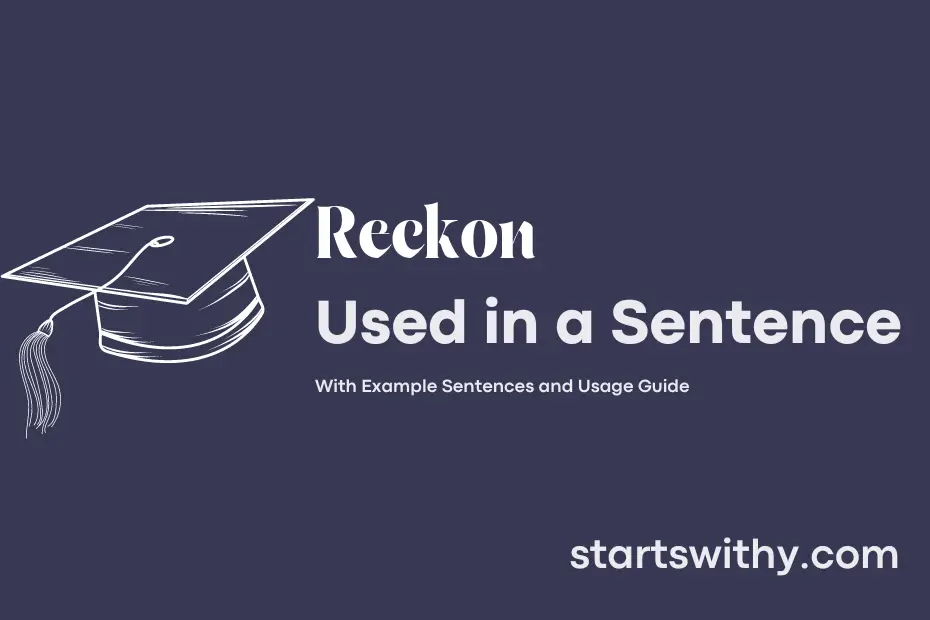Do you ever find yourself using the word “reckon” in your everyday conversations but wonder if you’re using it correctly? Let’s delve into the meaning and usage of this common term.
“Reckon” is a versatile verb that can mean to consider, believe, or suppose. It is often used informally in both American and British English, adding a casual and down-to-earth tone to a statement.
7 Examples Of Reckon Used In a Sentence For Kids
- I reckon the sun will shine tomorrow.
- Do you reckon we’ll have fun at the park?
- I reckon we should eat our fruits and vegetables every day.
- I reckon there are many stars in the night sky.
- Can you reckon how many colors are in a rainbow?
- I reckon we can all be friends and play together.
- Let’s reckon how many animals we can name.
14 Sentences with Reckon Examples
- I reckon that we should start preparing for our final exams now.
- Do you reckon we have enough time to finish this assignment before the deadline?
- I reckon it’s a good idea to join a study group to help with difficult concepts.
- Reckon we should attend that webinar on career opportunities next week.
- I reckon we can all meet at the library to work on our group project.
- Do you reckon we should buy the textbook or try to find a PDF online?
- I reckon it’s important to prioritize self-care during exam season.
- Reckon we should start looking for internships for the summer break.
- I reckon it would be beneficial to attend that workshop on time management.
- Do you reckon it’s worth joining the college debate team?
- Reckon we should form a study schedule to stay on track with our studies.
- I reckon we should start networking with alumni for career advice.
- Reckon it’s a good idea to explore different career paths before deciding on one.
- I reckon we should create a budget to manage our expenses effectively.
How To Use Reckon in Sentences?
To use Reckon in a sentence, simply replace the main verb “think” or “believe” with Reckon. This word is commonly used in British English and informal speech, making your sentences sound more natural and engaging.
For example:
– “I reckon the weather will be nice tomorrow.” (instead of “I think the weather will be nice tomorrow.”)
– “She reckons we should leave early to avoid traffic.” (instead of “She believes we should leave early to avoid traffic.”)
Remember to use Reckon when expressing personal opinions or beliefs to add a touch of informality to your speech or writing. However, it is important to note that this word may not be suitable for formal or professional contexts, so use it appropriately.
By incorporating Reckon into your vocabulary, you can sound more fluent and natural in casual conversations or writing. Practice using it in various contexts to become more comfortable with its usage and to enhance your language skills.
In conclusion, using Reckon is a simple yet effective way to make your sentences more dynamic and expressive. Experiment with incorporating it into your daily communication to see how it can add a new dimension to your language usage.
Conclusion
In conclusion, sentences with the word “reckon” are commonly used to express opinions or beliefs about something. The term is often employed in casual conversations to indicate a personal judgment or estimation. For instance, when someone says, “I reckon we should leave early to avoid traffic,” they are sharing their perspective on a situation. “Reckon” adds a colloquial and informal tone to sentences, making them sound more relatable and down-to-earth. It is a versatile word that can be used in various contexts to convey thoughts, predictions, or assumptions.
Overall, incorporating the word “reckon” in sentences can help convey a sense of personal evaluation or belief in a clear and straightforward manner. Its usage can add a touch of informality to discussions and make statements more engaging for the listener or reader.



